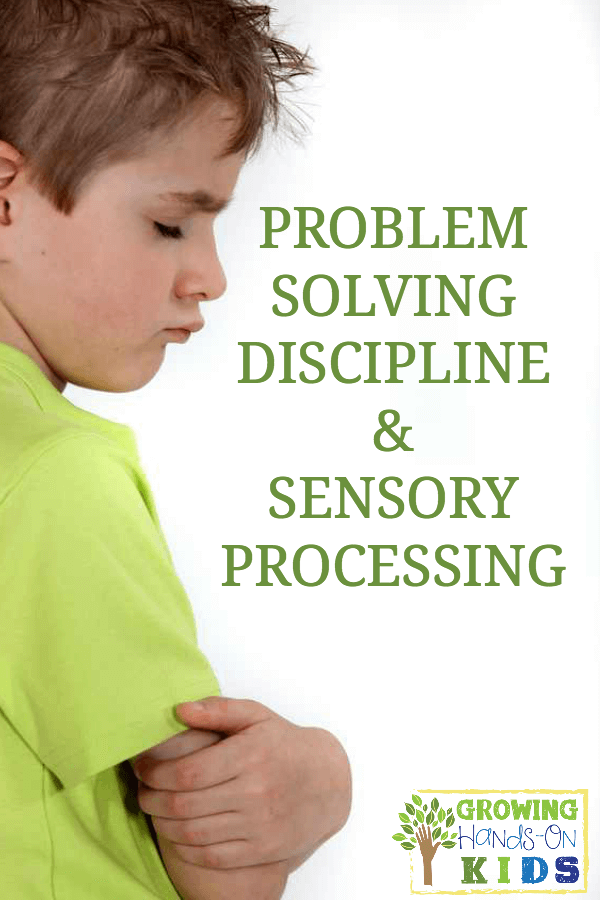Problem Solving Discipline & Sensory Processing
Affiliate and Referral links are used below to promote products I love and recommend. I receive a commission on any purchases made through these links. Please see my disclosure policy for more details. As an Amazon Associate, I earn from qualifying purchases.
The last four weeks we have looked at how behavior can be influenced by sensory processing. But even if your child has sensory processing problems, they still need structure, discipline, and rules. How do you balance disciplining your child with sensory processing problems along with trying to decrease those behaviors through addressing their sensory processing problems?
Today we are going to talk about how discipline might look, ideas on how to problem solve and find solutions for your family.
I want to start off by saying, I am in NO WAY a parenting expert or have all the answers on how to discipline children! We are just starting to enter the “terrible 2's” at our house, so I am sure my parenting will change with each situation. However, there are some general ways to problem solve behaviors and ways to go about discipline that won't make the situation worse and will help to decrease the behaviors your child may have.
The first thing is realizing that discipline will look different for every family and for every child! There is no “this is the only way to discipline” or “5 Easy ways to discipline your child”. What works for one child, may not or will not work for a different one. You have to take into consideration your child's temperament, behaviors, and responses to discipline into consideration before coming up with an appropriate response.
The next step is to set up your family rules, house rules or guidelines. I would definitely do this together as a family. That way everyone has input on what the rules and consequences would be. Here are some articles you can read for ideas on setting up family or house rules:
- House Rules – Supper Nanny
- Example of Household Rules for the Entire Family – About.com
- Family Rules – Raising Children Network
Setting Up Consequences for Children With Sensory Processing Problems
So here is where your ideas of consequences may need to change from your original ideas. Typically, children with sensory processing problems do not always respond to consequences the same as children without sensory processing problems.
I recently read a great article on this from Nancy Peske, co-author of Raising a Sensory Smart Child. Here is a quote from her article:
“When a child’s behavior is due to sensory processing disorder, punishment and reward do not work as motivators.” – Nancy Peske, co-Author of Raising a Sensory Smart Child.
Yikes! Nancy goes on to say that many children with sensory processing problems and disorders are reacting with behaviors due to their sensory processing. So instead of punishment or rewards, they need to be taught self regulation and proper social behaviors.
Something that Nancy Peske goes on to say, and also something I want to stress is that sensory kids still have just plain old kid behaviors! They are still going to act out in the grocery line because they see something they want and don't get it. Sometimes it is a little tricky to figure out if a behavior is truly a behavior or based on a sensory processing reaction.
I highly suggest you read Nancy Peske's article: Parenting with Sensory Smarts – Friends & Family for more ideas on how to give consequences and problem solve behaviors of children with sensory processing problems or disorders.
5 Questions to Ask Yourself When Problem Solving Behaviors
I know I said there isn't a magic formula to giving out consequences for behaviors or figuring out if it is really a behavior or sensory processing. But here are 5 questions I think you can ask yourself to get started…
1. Could my child have an underlying sensory processing problem? The only way to figure this out is to have a visit with your physician or pediatrician and also be evaluated by an Occupational Therapist that specializes in sensory processing. There are some signs and symptoms you can be on the look out for, which you can read about it my Sensory Processing Disorder series.
2. Has my child eaten something that could be affecting their behavior? It could be an allergy, too much sugar, not enough green leafy vegetables, not enough minerals or vitamins from food, eating too much processed foods and not enough whole foods, dyes or pesticides in the foods etc. You will also want to talk to your physician about any possible testing for food allergies and also a nutritionist or dietician about how foods could be affecting your child's behavior. I highly recommend getting in contact with Therapy Works CT and talking to the nutritionist and dietician they have on staff.
3. Has my child had too much screen time today/week, especially right before bed? You can read more about how screen time affects your child's behavior in my previous post. The average American child is exposed to 50 hours of screen time a week. And the recommended amounts are MUCH less than that. If you don't think screen time affects your child's behavior, then read my post! 🙂
4. How much sleep is my child getting? And what is affecting their sleep? We are all grouchy when we don't get enough sleep! Kids are no exception. Most of us can tell when our kids need more sleep. Do we need to change our routines so that the kids get to bed earlier? Does your child need a special routine to help signal that it is time for sleep?
5. Do I need to change how I am reacting to my child's behaviors? Sometimes the way we react can make the behavior even worse! Do we need to change the way we react to a certain behavior? That is something only you can answer for yourself.
Here are some great resources that I highly recommend reading or adding into your child's day to help decrease behaviors.
The Ultimate Guide to Brain Breaks – Sometimes children need breaks throughout their day to help them regroup and be able to focus later on. Getting out and moving also does huge things for mood and behavior. I definitely recommend this ebook and printable set from Heather Haupt. You can also read my review of Brain Breaks here.
You can catch up on all the posts in this series here:
- Is it Behavior? Or is it Sensory?
- How the Vestibular System Affects Behavior
- How Diet Affects Behavior
- Sleep & Screen Time
- Problem Solving Discipline & Sensory Processing
Want a Printable Version of This Behavior vs. Sensory Series?
I have a printable version of the entire 5 post series that you can download when you subscribe below. Just enter your e-mail address and click the “DOWNLOAD” button. You will need to confirm your subscription in an e-mail you receive in your inbox (double check your spam box if it does not show up in your inbox).
Once you have confirmed, you will automatically receive the free printable as a download on your computer. Please double check your “downloads folder” to find it and save it to your computer for future reference.
You can also follow my Pinterest boards below for more ideas:

Heather Greutman, COTA
Heather Greutman is a Certified Occupational Therapy Assistant with experience in school-based OT services for preschool through high school. She uses her background to share child development tips, tools, and strategies for parents, educators, and therapists. She is the author of many ebooks including The Basics of Fine Motor Skills, and Basics of Pre-Writing Skills, and co-author of Sensory Processing Explained: A Handbook for Parents and Educators.



Honestly being a parent is so hard, it can be overwhelming from time to time. Keeping your children’s habits and behavior under control is as difficult as it is important. Your posts have been helping my family greatly, Heather. Thank you!
What words to use in telling your sensory child to behavior and not just use be good what is an understanding phase so he understands clearly?
Having a child like that I’m sure is very difficult. You need to have a lot of patience. But your love for your child will always be there despite the situations like that. That is why I admire parents in that kind of situation because of their strength and their love for their child.
It’s hard for us because my 6 year old daughter has been diagnosed with SPD, but (OT/ child development works’ words) she does not need outside help since it’s on the mild end of the spectrum. While I am thankful that she is not on a higher level of SPD like the kids I read about (and I feel so bad for them and their families, knowing how hard it is for our family at times) it is sometimes VERY difficult to determine whether its sensory or just naughty behavior. She also has both avoiding AND seeking tendencies and also she may behave and be a totally “normal” child, and then out of nowhere have her issues and it varies ALL the time so I never know what to expect. I know to look for things like tags/clothing issues, changed plans, overload of new people or too many activities, but there are many times at home there aren’t any of those things going on and she still has meltdowns. PLUS, there are times where I can tell it STARTS at sensory then it’s as if it changes and (when I am so worn out and tired and have either reacted wrong or just plain cried, which I’m working on) she sees my reaction and then grins and it seems as if she is doing the behavior on purpose. I read in one of the sensory books that this type of SPD child is the hardest to raise because you do never know what happened to set them off and they change constantly. I fully agree.
I definitely agree with you Grace. It is very hard to tell and a lot of the times you most likely just have to guess or go with your best judgement based on the situation.
That IS so difficult Heather! Sometimes its hard to know if she is just being difficult just for the sake of being difficult, or is there a reason why she is so difficult! I know some stuff that triggers her, but are so new to this that we still have a long way to go. One thing I can say is that it is not easy being a parent of a SPD kid! Thanks for ts series, its been helping alot!
I am so glad this series has been helpful!! And kuddos to all parents of kids with SPD or any special needs! I know it is not an easy road!